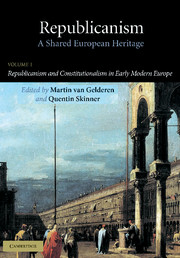Book contents
- Frontmatter
- Contents of Volume I
- Contents of Volume II
- Acknowledgments
- Introduction
- Part I The Rejection of Monarchy
- Part II The Republican Citizen
- 5 Citizenship and Republicanism in Elizabethan England
- 6 Republican Citizenship and Civic Humanism in the Burgundian-Habsburg Netherlands (1477–1566)
- 7 Civic Humanism and Republican Citizenship in Early Modern Germany
- 8 Civic Humanism and Republican Citizenship in the Polish Renaissance
- Part III The Republican Constitution
- Bibliography
- Contributors
- Index of Names of Persons
- Index of Subjects
6 - Republican Citizenship and Civic Humanism in the Burgundian-Habsburg Netherlands (1477–1566)
Published online by Cambridge University Press: 15 December 2009
- Frontmatter
- Contents of Volume I
- Contents of Volume II
- Acknowledgments
- Introduction
- Part I The Rejection of Monarchy
- Part II The Republican Citizen
- 5 Citizenship and Republicanism in Elizabethan England
- 6 Republican Citizenship and Civic Humanism in the Burgundian-Habsburg Netherlands (1477–1566)
- 7 Civic Humanism and Republican Citizenship in Early Modern Germany
- 8 Civic Humanism and Republican Citizenship in the Polish Renaissance
- Part III The Republican Constitution
- Bibliography
- Contributors
- Index of Names of Persons
- Index of Subjects
Summary
Do save the cities, I pray, together with your daughter Pallas, and provide their citizens, in your goodness, with peace and tranquillity.
Jacobus Canter, Dialogus de Solitudine (ca. 1491)The republican discourse of the Italian Renaissance is well known. To defend the community against faction and discord, the republican theorists argued – basing themselves on the works of Cicero, Livy and especially Sallust – that a free city needed to be a res publica. To guarantee the vivere libero, the city-state needed to create a constitutional framework such that the government reflected the res (the will of the community) and enhanced the publica (the general interest of the community) as a whole. Such a political community was, in republican discourse, best protected through government by law, by a mixed constitution and by the political virtue of its citizens.
By contrast, the political discourse in the Burgundian-Habsburg Netherlands remains largely unknown, with the one major and obvious exception of Erasmus. The political dimension of his thought is usually analysed together with the other key figure of Northern humanism, Thomas More. As has been argued by Quentin Skinner, John Guy and Brendan Bradshaw, there is a strong linguistic, conceptual and philosophical kinship between Erasmian humanism and the republicanism of the Italian renaissance (Bradshaw 1991; Guy 1993; Skinner 1987).
- Type
- Chapter
- Information
- RepublicanismA Shared European Heritage, pp. 107 - 126Publisher: Cambridge University PressPrint publication year: 2002
- 3
- Cited by



